A report by PricewaterhouseCoopers has cast a very interesting but very alarming light on the development of artificial intelligence and robots. The consultancy firm believes that potentially 30% of the UK workforce could be at risk of being replaced by a robot in the next 15 years. This equates to a staggering 10 million jobs with the wholesale and retail sectors set to be at highest risk. We published an article recently covering Bill Gates and his suggestion that robots were a major challenge going forward. Is Bill Gates right and are 10 million UK jobs at risk within 15 years?
Technology
There is no doubt that the number of companies and amount of money being invested into artificial intelligence has grown exponentially over the last decade. Often seen by the general public as a high-tech pie in the sky subject, artificial intelligence is one of the fastest-growing industries in the world. When you think about it, we already have an array of robots on production lines which have effectively replaced human beings. Many testing instruments today are robotic and again they have replaced a good old-fashioned worker. So, while it may be easier to ignore the onset of artificial intelligence, this is a ground breaking technology which is not going away.

Employment markets adapt
If you look back to the industrial revolution, employment markets around the world do adapt but such is the advancement in technology today that it is difficult to see how, in the UK alone, companies and the government could find an additional 10 million jobs. The figure of 10 million jobs replaced by robots is obviously the worst-case scenario but experts have begrudgingly accepted it will be in the millions in the UK and probably hundreds of millions around the world.
Historically work intensive sectors have to a certain extent been protected from technological advances but even they are being impacted today. It is all about saving money, increasing profits and become as efficient as possible. There is pressure not only on corporate entities to become more efficient and more profitable but also public services. In reality, many public services are significantly more bloated than the corporate sector and should in theory be more at risk from robotic replacements. However, this would probably not fit the needs of the political elite who would still require votes from the general public.
Taxing each robot
One subject which could become a reality, sooner rather than later, is some kind of “robot tax” on those machines which replace humans. If you think about it, each worker taken out of the workforce is one less tax income stream for governments around the world. Therefore, the introduction of some kind of revenue related robot tax would maintain government income to a certain extent and the funding of public services. However, would this not reduce the potential efficiency of the robotic workforce?
In reality, any additional costs on top of funding requirements for the robotic workforce would impact their efficiency and attractions to the corporate market. The threat of a “robot tax” might even go as far as to save millions of jobs around the world where the introduction of a robotic workforce is borderline when looking at the overall cost figures. The natural industrial cycle is to become more efficient and increase profitability but how can governments really sit by and watch their tax revenues slashed?
